The Many Benefits of Gardening

Spring arrived just a couple weeks ago, and gardeners everywhere are in the throes of working through their “to do” lists.
Just think about all the wonderful harvest of fresh produce grown from seeds. And how about the lovely blooms that attract the butterflies and add pops of color in your yard. The joys of gardening don’t need to be explained to devotees.
So let’s explore the health benefits for older adults that may not be so well known. And perhaps if you’ve been wondering if you should give gardening a try and the best way to get started, this information might be just the motivation you need!
Research Reveals Gardening Health Benefits
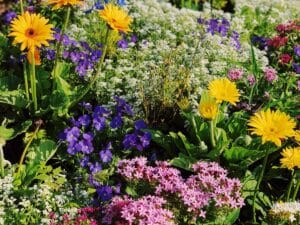 Over the last few years, several research studies have concluded that gardening provides valuable health benefits. These include exercise, stress relief, a greater sense of life satisfaction, and even improved brain health.1
Over the last few years, several research studies have concluded that gardening provides valuable health benefits. These include exercise, stress relief, a greater sense of life satisfaction, and even improved brain health.1
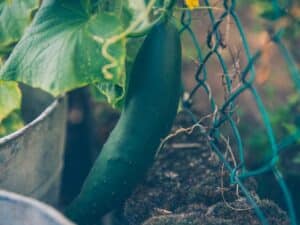 These benefits can be enjoyed by people of all ages. In this article, we will explore some of the research findings. And we will also touch on safe gardening practices.
These benefits can be enjoyed by people of all ages. In this article, we will explore some of the research findings. And we will also touch on safe gardening practices.
Gardening & Mental Wellbeing
Researchers in the Netherlands have found gardening to be a very effective stress relieving activity.2 They asked two groups of subjects to complete a stressful task called the Stroop Test*. Afterward, one group was directed to garden for 30 minutes, while the other group was told to read quietly indoors for the same period of time.
The results of the study were that the gardening group not only reported a greater improvement in mood, but their bloodwork also revealed lower levels of the stress hormone cortisol, compared to those who tried to relax by reading. For years, gardeners have been saying it’s their “therapy.”
Now we have proof.
Gardening & Improved Cognition
Another interesting study correlated gardening activities with improved cognition.3 A group of seniors, (average age 76), were asked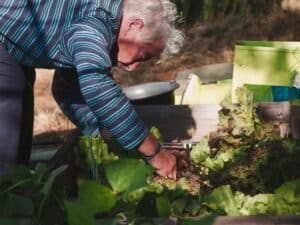 to participate in 20 minutes of low-to-moderate intensity gardening activities. These included cleaning a garden plot, digging, fertilizing, raking, planting/transplanting, and watering.
to participate in 20 minutes of low-to-moderate intensity gardening activities. These included cleaning a garden plot, digging, fertilizing, raking, planting/transplanting, and watering.
As in the Netherlands study, blood samples were taken afterward. Researchers found higher levels of the proteins needed to promote brain cell growth, especially those responsible for memory and cognitive function.
If this beneficial result occurred after only 20 minutes, imagine how beneficial it might be to garden on a regular basis!
The Joy of Dirt
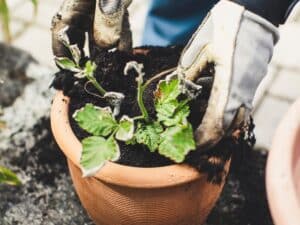 Many other studies have corroborated these findings. Even a little bit of gardening may hold the key to improved mental health, stress relief and much-needed exercise in a world where many of us spend our days in mostly sedentary activities.
Many other studies have corroborated these findings. Even a little bit of gardening may hold the key to improved mental health, stress relief and much-needed exercise in a world where many of us spend our days in mostly sedentary activities.
But did you know that recent studies are suggesting that the beneficial microorganisms in the soil may be, at least in part, responsible for these effects?4 The citation for this claim in the list of references below sounds fairly complicated, but the takeaway is clear: Gardening may actually lower systemic inflammation.
Once again, it turns out that digging in the dirt is good for us!
Gardening & Falls
While we’re having fun with our plants, let’s make sure we don’t run into trouble by using poor body mechanics or overdoing it.
Friends Life Care reviews the trends in their memberships’ health on an ongoing basis. This helps the wellness and care coordination team with development of prevention-oriented recommendations.
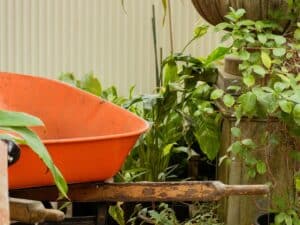 And each spring, they see that falls and injuries do occur while people are getting the lawn, gardens, and potted plants showroom ready.
And each spring, they see that falls and injuries do occur while people are getting the lawn, gardens, and potted plants showroom ready.
Friends Life Care members reported that they were injured during different aspects of gardening. Falls occurred when people were turning too fast, applying a lot of pressure to tools like a shovel, rushing through uneven beds, dragging heavy hoses, wrestling bags of mulch, and more.
Others fell when their feet were caught up in clippings or yard debris, or were maneuvering a wheelbarrow or other wheeled equipment on a slick patch or muddy slope.
Tips For Safe Gardening
An important first step in avoiding falls and injury is awareness. In addition, here are some tips you may find helpful:
- Before you begin your gardening for the day, warm up your muscles by stretching and going for a 10-minute walk in the neighborhood. If you have enough space, you could possibly do this around your own garden. Walk about and survey what needs to be done.
- Use the right tools. For example, there are many ergonomically designed, lightweight tools that make gripping less stressful on the joints of your hands and wrists. Another example would be tools with longer handles that allow you to reach the ground more easily. The Top 9 Ergonomic Gardening Tools For Seniors – Garden Song
- Keep your tools nearby with a gardening apron. 6 Best Gardening Aprons for 2021 – Gardening Channel
- Replace your old garden hose with a new lightweight one. Hoses (gardeners.com)
- Do not bend from your waist with straight knees when lifting. People of any age run the risk of damaging their back that way! Learn how to squat by bending from your hips and knees while keeping your spine relatively straight. Better yet, use a gardening stool.
- Container gardening: Consider what plants would work in container gardening so you avoid stooping as much.
- Get raised beds installed to also elevate your plantings
More Tips For Safe Gardening
- Set a timer so you don’t overdo it. Aim for no longer than 20 – 30 minutes at a stretch.
- Vary your tasks and pace yourself. For example, you could spend a little time weeding, and then switch to an activity like trimming a hedge that doesn’t require you to work at lower surfaces.
- Stay well hydrated, especially in summer months.
- Don’t forget the sunscreen to protect yourself from sunburn.
- Probably most important of all is listen to your body. We almost always know when it’s time to quit for the day, and injuries often happen when we ignore those signals.
More Inspiration For Your Garden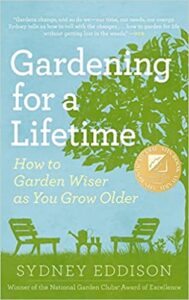
Over the last few years, I have been aiming to cultivate a garden where I need it more than it needs me. I have found enormous inspiration from Sydney Eddison’s book, Gardening for a Lifetime: How to Garden Wiser as You Grow Older. I recommend this reading for older adults who want to continue to garden as they age.
Among the topics she discusses are using lower maintenance plants, labor-saving techniques, creating miniature landscapes, and my all-time favorite, accepting imperfections.
Happy gardening!
Contributed by:
 Joanne Fagerstrom, PT
Joanne Fagerstrom, PT
Joanne Fagerstrom, PT, CFP, has been a physical therapist since 1978 and is the owner of Mindful Physical Therapy, LLC. She specializes in treating patients with osteoporosis and low bone mass (osteopenia).
Joanne places a strong emphasis on wellness and prevention in her treatment programs. Her training in the Feldenkrais Method adds an important dimension to her practice of physical therapy. Through appropriate, evidence-based exercise instruction and body awareness education, she aims to help each person achieve their greatest potential for function, health and wellness.
In 2009, after being diagnosed with osteoporosis, Joanne began the research and development of her comprehensive bone health program. She works with her patients both on an individual basis and in her weekly Strong Bones exercise classes. She presents the latest information in the field of osteoporosis in her annual workshop called Taking Charge of Your Bone Health. In 2019, Joanne augmented her work by completing a 6-month online certificate program for nutrition through Cornell University.
Joanne is frequently asked to share her expertise in publications such as the Chestnut Hill Local, Weaver’s Way Co-op’s The Shuttle, and the Philadelphia Corporation for Aging’s Milestones – and even on ABC Channel 6 WPVI-TV. Read and/or download PDFs of recent articles with the links below:
Read Online: Wyndmoor Therapist Goes Virtual to Keep Patients Holding Steady. The Shuttle, Vol. 49, No. 1, Feb 2021. (Download as PDF)
Read Online: Take a Hike – It’s Good For Your Bones. The Shuttle, Vol. 46, No. 9, Sept 2018. (Download as PDF)
Read/Watch Online: WPVI-TV Health & Fitness: Stronger bones are target of specialized class, July 6, 2017.
Note: If you use an ad blocker, you must temporarily disable it to watch the video version online.
Read Online: To Fight Osteoporosis, Work on Balance and Strength. The Shuttle, Vol. 44, No. 12, p. 17, Dec 2016. (Download as PDF)
Read Online: Winter Fitness Strategies. PCACares Milestones, Dec 6, 2016. (Download as PDF)
Read Online: Good Posture. Good Function. Good Health. The Shuttle, Vol. 44, No. 1, p. 11, Jan 2016. (Download as PDF)
Read Online: No Bones About It: Here’s How to Prevent Osteoporosis. Chestnut Hill Local, June 18, 2015. (Download as PDF)
Read Online: Joanne Fagerstrom Spreads Gospel of Good Bone Health. Chestnut Hill Local, Feb 26, 2015. (Download as PDF)
Read Online: ‘Motion is the Lotion’ for Chestnut Hill Exercise Guru. Chestnut Hill Local, Oct 25, 2013. (Download as PDF)
References:
- Soga M, et al. Gardening is Beneficial for Health: A Meta-analysis. Preventive Medicine Reports 2016 Nov 14;5:92-99.
- Van Den Berg AE, et al. Gardening Promotes Neuroendocrine and Affective Restoration from Stress. Journal of Health Psychology. 2011;16(1):3-11.
- Park SA, et al. Benefits of Gardening Activities for Cognitive Function According to Measurement of Brain Nerve Growth Factor Levels. International Journal of Environmental Research and Public Health. 2019 Mar 2;16(5):760.
- Frank MG, et al. Immunization with Mycobacterium Vaccae Induces an Anti-inflammatory Milieu in the CNS: Attenuation of Stress-induced Microglial Priming, Alarmins and Anxiety-like Behavior. Brain, Behavior and Immunity 2018 Oct;73:352-363.
*The Stroop Test requires individuals to view a list of words printed in a different color than the meaning of the word. Participants are tasked with naming the color of the word, not the word itself, as fast as they can. For example, when presented with the word “green” that is written in red ink, it is much easier to name the word that is spelled, as opposed to the color ink in which the word is written.
Friends Life Care posts on the eMeetinghouse blog. as another way to share health, wellness and prevention information with aging adults. Friends Life Care is a mission-driven nonprofit that — for over 30 years — has been helping seniors — especially Friends Life Care members — to thrive at home as they age. If you are not yet a Friends Life Care member, connect with us with questions for one of our Plan Counselors on the benefits of joining.
